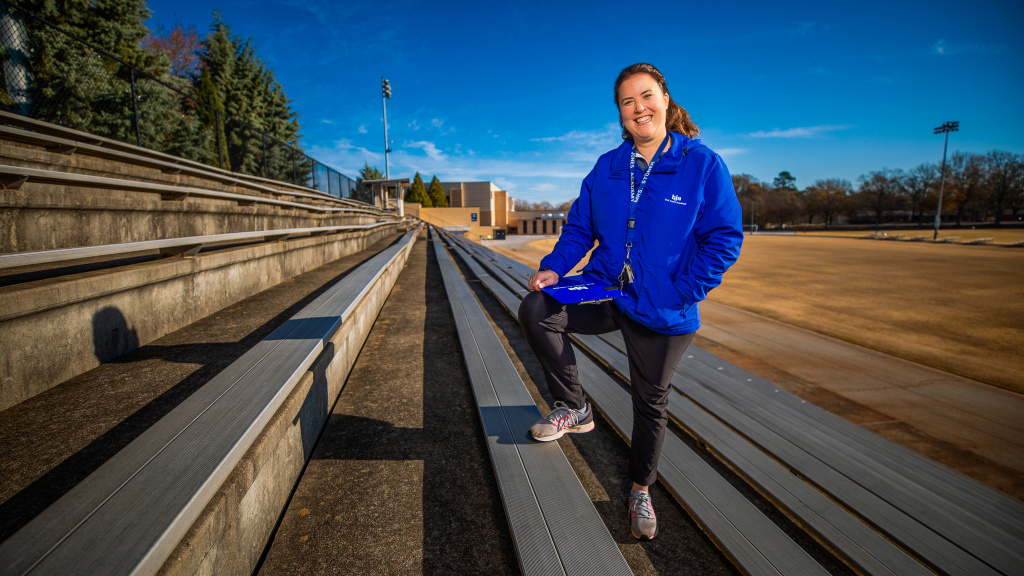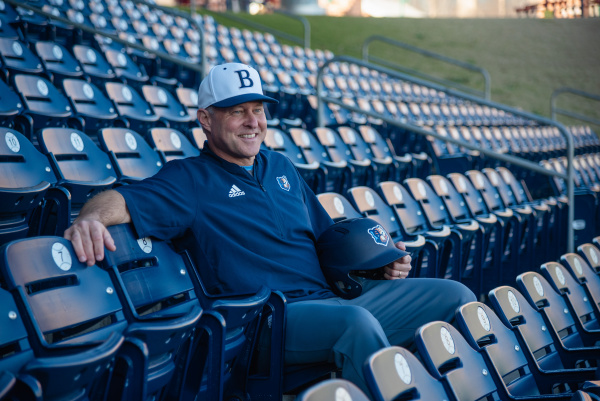“I never would have imagined as a kid … I’d get to ref the national team,” Melanie Stoner (BJU ’04) said.
Stoner’s passion for soccer was obvious early on in her life. “My sixth-grade teacher, Mr. Smith, told my dad that he needed to start a soccer team for the girls in my class because we were really into soccer,” she said. They began playing together in a recreational league and continued during high school in addition to playing for their societies at BJU Academy.
The U.S. team’s victory in the first Olympic women’s soccer tournament in 1996 further fueled her interest. “For years they won hands-down every Olympic, every World Cup,” she said. “When I saw that as a kid, I wanted that and I wanted to be on that team.”
Refereeing Journey
While many of her friends decided to play soccer more competitively, Stoner chose a different route — refereeing. “It’s a different view of the game, and you get paid to do it,” she said. “I really enjoyed it.”
Throughout high school, she refereed weekend and sometimes weeknight games, some of which were for high school soccer leagues. “I wasn’t a babysitter. I didn’t work at a restaurant or anything,” Stoner said. “Soccer was it.”
Taking Advantage of Opportunities
When Stoner was a freshman at BJU, she was invited to a tournament in San Diego for a new women’s professional league. Thrilled for the chance but doubtful she would be allowed to go, she approached the dean of women.
To Stoner’s surprise, she received permission to miss school for the tournament. “It was a week and a half, which absolutely killed my grades,” she said, “but I went out there and got to referee pretty much the women’s national team.”
At the tournament, Stoner was surrounded by professional referees. As the youngest one there, she was dumbfounded when Kari Seitz, one of the top referees in the world, came to talk to her after a game. Seitz asked Stoner if she had heard someone yelling at her the entire game. Stoner had, but she had avoided looking to concentrate on her calls. To her astonishment, she learned it was professional soccer player Mia Hamm. “Ever since then, all the referees — because I was the kid — called me Mini Mia because I just was like, ‘No, she was the coolest player ever and she was yelling at me? Come on!’ ”
That trip paved Stoner’s way to becoming a college soccer referee. Though she was eligible once she became a BJU student, Stoner needed an introduction to that level. At the tournament, she met one of the few FIFA referees in the U.S. “She got me into college soccer,” she explained. “I got to go to the NCAA finals, all three leagues. … Not a lot of people get that chance.”
After she became a college referee, Stoner was able to become a national referee in 2010. “I had multiple opportunities to do the women’s national team,” she said. “Not everybody gets to do that.”
Refereeing Experiences
As a woman in a male-majority referee pool, she had to work hard to take advantage of the opportunities that came her way. Consequently, being chosen to call games was significant. “If you’re good, they’re going to notice it, and they’re going to let you go and do these games,” she said.
She also had opportunities to call games for both men and women. Said Stoner: “I was in many men’s games. … Most of the time, I was assigned to the side … and a few times I would get in the middle and I’d have the whistle.
“One game in Charleston, I remember it was a different experience doing the men. I refereed them so many times on the side, so it was kind of fun to finally get to go in the middle. And I already knew the guys, they already knew me. But it’s different. They don’t like to see women refereeing their games. But I think over the years of me on the side, they were OK with me in there. And I think I did OK, but I think I enjoyed more being on the side.”
The Turning Point
As a Grade 3 referee, Stoner had the potential to advance to Grade 1 or 2, meaning she would be able to referee internationally. However, she did not pass the required fitness tests. “I did everything I could … but I think the Lord just didn’t want me to do it,” she said. She had just started dating her future husband, and she now realizes that being an advanced referee would not have been compatible with a family.
However, she recognized the privilege it was to advance as far as she did. “Looking back at those relationships that I made (in San Diego), I don’t know how they got my name,” Stoner said. “But I met … all the referees that end up being the assignors later in life, and they end up being the mentors and the coaches.”
Not only did God provide Stoner with opportunities to referee, He also gave her chances to witness to referees who had become her friends. “I always felt like the Lord wanted me there,” she said. “He just opened up doors. … There were many opportunities that I had with those people that I got to share what I believed.” She added, “There are some people that I just flat out gave them the Gospel.”
At other times she let kindness to others serve as her testimony.
The Balance Between Teaching and Refereeing
Although Stoner enjoyed refereeing, she knew that it would never be a full-time career. “Probably 85% of the referees that are out there … it’s like a part-time job — probably more of a hobby than a job,” she said. “I remember even starting young when they would tell me, ‘You don’t ref soccer for the money.’ ”
When Stoner was in sixth grade at the Academy, she had told her PE teacher she was going to replace her one day. However, Stoner did not have that career in mind when she chose to study health fitness and recreation at BJU. “I didn’t have a plan,” she said.
During her sophomore year, the Academy principal who had been her sixth-grade teacher prompted her to consider teaching. Said Stoner: “He emailed me and said, ‘You need to look into being a PE teacher. I want you to come back.’ And I thought, no, I couldn’t do that.”
But she changed her mind. After graduating from BJU in 2004, she went to teach at a small school in Macon, Georgia. About two years later, Dave Fisher contacted her about an open position at Bob Jones Elementary School. Her PE teacher, whose job she wanted to have as a sixth grader, wanted to transition to the Primary Center. “I just thought that would be so cool,” Stoner said. “It was so neat how God just opened the doors.”
Since the fall of 2006, she has enjoyed working at the Academy because of the Christian atmosphere and the impact she has on the students. “I walk down the hallway, and I feel like a star here,” she said. “The kids are always like, ‘There’s Mrs. Stoner! Hey, Mrs. Stoner!’”
Refereeing Opportunities While Teaching
Especially during soccer season in the fall, Stoner continued to referee on weekends — and occasionally weeknights — while she taught in Georgia and then South Carolina. Once she was qualified to referee national soccer, Stoner called those games, often traveling out of state. “My boss was really excited about me doing it,” Stoner said. “He always said it was good … that the school had someone that was participating in something nationwide.
“The kids just loved it when I would say, hey, watch ESPN this weekend. … I’m going to be on, and they would watch. It was cute.”
Making the Transition from Refereeing
Stoner retired from refereeing when she was expecting a daughter in 2014. During one game she decided to ask for a sub at halftime. “I can remember … saying I don’t think I want to do this anymore,” she said. “It was almost like I knew, this is it for me.” She confirmed her decision by sending back the list of future games assigned to her.
Playing, refereeing or watching soccer had always occupied her time, but at that point, her family became her priority. “My goals in life completely changed,” she said. “I lost the interest to go back. … There’s so much training that is involved that I didn’t want to leave her. I didn’t want to leave my husband.
“I felt like the family was what I really wanted deep down. And now that’s what I have, and I wouldn’t trade it for anything.”
Stoner still considers herself a referee but at home instead of on the field. “I’m a referee full time of three children that are all 6 and under, and I am making calls all the time,” she said. Additionally, she said she applies “man-managing skills” she learned as a referee to her students.
Although she has had the occasional opportunity to mentor referees, mentoring is not the same as refereeing. “I definitely miss it,” Stoner said. “Someday I might go back out to the soccer field, but I’m going to wait for my kids to grow up and see what they want to do.”








